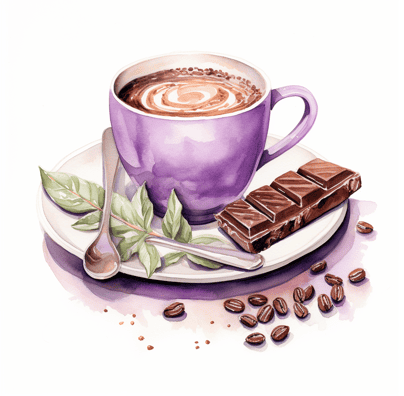
Choosing between brewed cacao vs coffee can be tricky, especially when you’re aiming for better health and beauty. In this post, I’ll help you decide which drink best fits your goals.
Hi, I’m Hazel
I gave up on skincare after years of issues with acne and sensitive skin.
But after going plant-based, my skin cleared up and even started to glow. Now I help women reveal their natural beauty with simple, delicious plant-based food.
I also used to be a nurse, and love nerding out on nutritional science (high-quality science, that is).

As usual, this post is based on the strongest nutritional evidence I could find with a focus on the simplest, most delicious foods
…because who has time to waste on actions that don’t work?
The quick version:
Brewed cacao offers sustained energy and skin benefits with fewer jitters, while coffee provides a quick energy boost and improved focus. Avoiding dairy milk maximises the absorption of beneficial compounds in both drinks.
Skincare Benefits
Cacao
Boosts Your Antioxidants
The antioxidants in cacao—specifically flavanols (flavan-3-ols)—support cardiovascular health by improving blood vessels (1). Improved blood flow means more nutrients to your skin!
Cacao’s antioxidants also reduce inflammation, which is essential for clear and youthful skin (2).
Wrinkle Prevention
Cocoa can reduce wrinkles by increasing blood flow within the skin.
Consuming 2.5 teaspoons of cocoa powder in a drink leads to significant improvements in blood flow and oxygen saturation within two hours (3). This enhances skin vitality and reduces fine lines.
Consuming cocoa daily for 24 weeks (about 5.5 months) improves skin elasticity and reduces wrinkle depth (5). This makes your skin look firmer and more youthful over time.
Given that cacao is minimally processed cocoa, it likely shares these anti-wrinkling benefits due to its high flavanol content.
UV Protection

Daily consumption of cocoa for six weeks provides increased protection from UV light, reducing skin redness by 15% (3).
After 12 weeks, redness was reduced by 25%. This means fewer sunburns and less UV damage, keeping your skin looking younger and healthier.
Cacao, with its high antioxidant content, likely offers similar UV protection benefits.
Improved Skin Texture
Cocoa improves skin thickness, density, and hydration, and reduces skin roughness and scaling (4).
These benefits were observed when compared to a placebo (cocoa with most flavanols removed) which means we can be very certain that it works.
Smoother, more hydrated skin helps you look radiant and feel confident. Since cacao is rich in flavanols, it should provide comparable improvements in skin texture.
Reduced Oxidative Stress
Cacao contains salicylic acid, similar to aspirin, which helps reduce oxidative stress (6). Reduced oxidative stress means fewer signs of ageing and healthier skin overall.
Coffee
Drinking coffee is associated with various skin protection benefits as well.

Fewer Pigmented Spots
Regular coffee drinkers have fewer pigmented spots on their faces (7).
This helps maintain an even skin tone and reduces the appearance of age spots.
Antioxidant Boost
Coffee contains melanoidin, an antioxidant that helps protect your skin from damage (8).
Both light and medium roasts can increase antioxidant status in the bloodstream, contributing to overall skin health.
Inhibiting TOR Activity
A cup of coffee can inhibit TOR activity, which is linked to ageing (9).
This means that coffee helps slow down the ageing process, keeping your skin looking youthful longer.
Activating Autophagy
Coffee activates autophagy, the process where your body cleans out damaged cells and regenerates new ones (10).
Decaffeinated coffee works just as well, making it a great option for those sensitive to caffeine (11).
This cellular renewal process is essential for maintaining healthy, vibrant skin.
Lifting Your Energy and Mood

Cacao
For a gentle energy boost without the jitters, a brewed cacao beverage is perfect.
The theobromine in cacao provides sustained energy with less caffeine than coffee. Cacao also acts as a mood enhancer, making you feel good while keeping you alert.
During exam time or whenever you need mental clarity, a cup of cacao may increase global cognitive function and BDNF levels (12).
Better cognitive function can reduce stress, which often shows up on your skin. Less stress means fewer breakouts and a healthier complexion.
Coffee
If you need a strong, immediate boost, coffee is your friend.
With its higher caffeine content, coffee improves focus and mental alertness. Regular coffee drinkers appreciate the naturally occurring stimulant in coffee beans that helps with focus and alertness. Whether it’s your morning coffee or an afternoon pick-me-up, coffee drinks offer that instant energy surge.
Both light and medium roasts can boost the antioxidant status of the bloodstream, which can also help lift your mood.
Weight Loss

Cacao
Cacao acts as a natural appetite suppressant, helping to reduce cravings and control weight (13). Using raw cacao/cacao powder in your diet can aid in weight management.
Coffee
By boosting metabolism,coffee helps burn fat more effectively.
Drinking three cups of coffee a day can increase Bifidobacteria in the gut within three weeks, contributing to better gut health and weight management (14).
Choose options with less caffeine if you’re sensitive, but still want to enjoy the benefits of coffee for weight management.
But Watch Out for These Drawbacks
While both brewed cacao and coffee have great benefits, they also come with some downsides.
The Downsides of Cacao
Though cacao is nutrient-rich, consuming it with sweeteners or creamers can add unnecessary calories. Even a delicious cup of cacao or hot chocolate can become high-calorie (in the bad way) if not prepared carefully.
Additionally, some people might experience digestive issues with cacao products.
The Concerns with Coffee
Coffee can cause jitters and anxiety, especially if you consume too much.
Beware of potential caffeine dependency, which can lead to withdrawal symptoms if you cut back suddenly. Regular coffee drinkers might also experience increased heart rate and higher blood pressure.
The Mistake Destroying the Nutrition of Your Cacao/Coffee
Are you unknowingly sabotaging the health benefits of your favourite brewed cacao or coffee? Consuming these drinks with dairy milk could be the culprit.

Cacao
The nutrients in cocoa reduce oxidative stress, however only dark chocolate provides this benefit, not milk chocolate or white chocolate (15).
That’s because when you enjoy cocoa with dairy milk (such as milk chocolate and even dark chocolate) the absorption of essential nutrients is significantly reduced.
Dairy milk contains casein, a protein that binds to antioxidants and polyphenols found in cocoa beans (16).
So when you drink your brewed cacao beverage or eat chocolate products with dairy milk, a lot of these beneficial compounds are not absorbed by your body.
Coffee
Coffee also suffers from the same issue.
While it contains more than a thousand bioactive compounds, chlorogenic acid is the most abundant polyphenol (17). In black coffee, the bioavailability of chlorogenic acid is at 68%. However, when you add dairy milk to make a latte, antioxidant availability drops to just 40% (18).
The end result is a significant reduction in the nutritional benefits of your coffee.
Taste and Enjoyment
Enjoying the flavour profile of your drink is just as important as the health benefits.
Cacao
Known for its rich, chocolatey flavour with a hint of bitterness, cacao is perfect for those who love a chocolatety aroma.
Whether you use cacao powder or pure ground cacao beans, the slightly bitter taste is unique and satisfying.
Coffee
Bold and earthy, coffee offers a variety of flavours depending on the roast.
From coffee beans brewed using a coffee maker to instant coffee, there’s a taste for every preference. Traditional coffee can be enjoyed in many forms, making it versatile.
How to Enjoy Each
Cacao
Ideal for hot drinks, smoothies, and desserts, cacao can be enjoyed in many ways.
Try a cacao brew or add one to two tablespoons of cacao to a smoothie recipe for a healthy twist that feels indulgent.
Coffee
Perfect as a morning coffee or an afternoon boost, coffee can be enjoyed hot or cold. Experiment with different coffee drinks to find what suits your taste.
Which One Is Best For You?
Choosing between brewed cacao vs coffee depends on your personal health goals and lifestyle preferences.
Health Goals
If you’re aiming for radiant skin and steady energy, cacao might be the better choice.
Plus, the antioxidants in cacao support overall heart health by improving blood flow and reducing blood pressure.
Its low caffeine content also makes it ideal for those sensitive to stimulants.
For a Quick Energy Surge
For those needing a fast energy boost and improved cognitive function, coffee could be your go-to.
But I Still Can’t Decide!
If you can’t decide, try cacao coffee for a blend of both flavours. It combines the rich, chocolatey taste of cacao with the boldness of coffee, offering a unique drinking experience.
Brewed Cacao vs Coffee
Whether it’s a cup of coffee made with your favourite coffee maker or a warm cacao brew, each has its charm. Explore different coffee drinks and cacao recipes to find your perfect match. Both options can be part of a healthy, enjoyable daily routine.
References
Most references below will link to the original peer-reviewed study itself. However, sometimes I will link to a video over at NutritionFacts.org instead, which is by far the single best resource of brutally transparent nutritional evidence you will ever see. Dr Greger tells a great story about the realities of the science and if I think you will benefit more from one of his videos, the link will take you there instead.
Happy nerding!
- Miller KB, Hurst WJ, Payne MJ, et al. Impact of alkalization on the antioxidant and flavanol content of commercial cocoa powders. J Agric Food Chem. 2008;56(18):8527-8533. doi:10.1021/jf801670p
- Vázquez-Agell M, Urpi-Sarda M, Sacanella E, et al. Cocoa consumption reduces NF-κB activation in peripheral blood mononuclear cells in humans. Nutr Metab Cardiovasc Dis. 2013;23(3):257-263. doi:10.1016/j.numecd.2011.03.015
- Neukam K, Stahl W, Tronnier H, Sies H, Heinrich U. Consumption of flavanol-rich cocoa acutely increases microcirculation in human skin. Eur J Nutr. 2007;46(1):53-56. doi:10.1007/s00394-006-0627-6
- Heinrich U, Neukam K, Tronnier H, Sies H, Stahl W. Long-term ingestion of high flavanol cocoa provides photoprotection against UV-induced erythema and improves skin condition in women. J Nutr. 2006;136(6):1565-1569. doi:10.1093/jn/136.6.1565
- Yoon HS, Kim JR, Park GY, et al. Cocoa Flavanol Supplementation Influences Skin Conditions of Photo-Aged Women: A 24-Week Double-Blind, Randomized, Controlled Trial. J Nutr. 2016;146(1):46-50. doi:10.3945/jn.115.217711
- Malakar, Sreepurna & Gibson, Peter & Barrett, Jacqueline & Muir, Jane. (2016). Naturally Occurring Dietary Salicylates: A Closer Look at Common Australian Foods. Journal of Food Composition and Analysis. 57. 10.1016/j.jfca.2016.12.008.
- Fukushima Y, Takahashi Y, Hori Y, et al. Skin photoprotection and consumption of coffee and polyphenols in healthy middle-aged Japanese females. Int J Dermatol. 2015;54(4):410-418. doi:10.1111/ijd.12399
- Morales FJ, Somoza V, Fogliano V. Physiological relevance of dietary melanoidins. Amino Acids. 2012;42(4):1097-1109. doi:10.1007/s00726-010-0774-1
- Wanke V, Cameroni E, Uotila A, et al. Caffeine extends yeast lifespan by targeting TORC1. Mol Microbiol. 2008;69(1):277-285. doi:10.1111/j.1365-2958.2008.06292.x
- Sinha RA, Farah BL, Singh BK, et al. Caffeine stimulates hepatic lipid metabolism by the autophagy-lysosomal pathway in mice. Hepatology. 2014;59(4):1366-1380. doi:10.1002/hep.26667
- Pietrocola F, Malik SA, Mariño G, et al. Coffee induces autophagy in vivo. Cell Cycle. 2014;13(12):1987-1994. doi:10.4161/cc.28929
- Neshatdoust, S., Saunders, C., Castle, S. M., Vauzour, D., Williams, C., Butler, L., Lovegrove, J. A., & Spencer, J. P. (2016). High-flavonoid intake induces cognitive improvements linked to changes in serum brain-derived neurotrophic factor: Two randomised, controlled trials. Nutrition and healthy aging, 4(1), 81–93. https://doi.org/10.3233/NHA-1615
- Massolt ET, van Haard PM, Rehfeld JF, Posthuma EF, van der Veer E, Schweitzer DH. Appetite suppression through smelling of dark chocolate correlates with changes in ghrelin in young women. Regul Pept. 2010;161(1-3):81-86. doi:10.1016/j.regpep.2010.01.005
- Jaquet M, Rochat I, Moulin J, Cavin C, Bibiloni R. Impact of coffee consumption on the gut microbiota: a human volunteer study. Int J Food Microbiol. 2009;130(2):117-121. doi:10.1016/j.ijfoodmicro.2009.01.011
- Mehrabani S, Arab A, Mohammadi H, Amani R. The effect of cocoa consumption on markers of oxidative stress: A systematic review and meta-analysis of interventional studies. Complement Ther Med. 2020;48:102240. doi:10.1016/j.ctim.2019.102240
- Serafini M, Bugianesi R, Maiani G, Valtuena S, De Santis S, Crozier A. Plasma antioxidants from chocolate. Nature. 2003;424(6952):1013. doi:10.1038/4241013a
- Poole R, Kennedy OJ, Roderick P, Fallowfield JA, Hayes PC, Parkes J. Coffee consumption and health: umbrella review of meta-analyses of multiple health outcomes [published correction appears in BMJ. 2018 Jan 12;360:k194]. BMJ. 2017;359:j5024. Published 2017 Nov 22. doi:10.1136/bmj.j5024
- Duarte GS, Farah A. Effect of simultaneous consumption of milk and coffee on chlorogenic acids’ bioavailability in humans [published correction appears in J Agric Food Chem. 2011 Oct 12;59(19):10772]. J Agric Food Chem. 2011;59(14):7925-7931. doi:10.1021/jf201906p